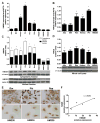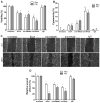Cancer cell secretion of the DAMP protein HMGB1 supports progression in malignant mesothelioma
- PMID: 22552293
- PMCID: PMC3389268
- DOI: 10.1158/0008-5472.CAN-11-3481
Cancer cell secretion of the DAMP protein HMGB1 supports progression in malignant mesothelioma
Abstract
Human malignant mesothelioma is an aggressive and highly lethal cancer that is believed to be caused by chronic exposure to asbestos and erionite. Prognosis for this cancer is generally poor because of late-stage diagnosis and resistance to current conventional therapies. The damage-associated molecular pattern protein HMGB1 has been implicated previously in transformation of mesothelial cells. Here we show that HMGB1 establishes an autocrine circuit in malignant mesothelioma cells that influences their proliferation and survival. Malignant mesothelioma cells strongly expressed HMGB1 and secreted it at high levels in vitro. Accordingly, HMGB1 levels in malignant mesothelioma patient sera were higher than that found in healthy individuals. The motility, survival, and anchorage-independent growth of HMGB1-secreting malignant mesothelioma cells was inhibited in vitro by treatment with monoclonal antibodies directed against HMGB1 or against the receptor for advanced glycation end products, a putative HMGB1 receptor. HMGB1 inhibition in vivo reduced the growth of malignant mesothelioma xenografts in severe-combined immunodeficient mice and extended host survival. Taken together, our findings indicate that malignant mesothelioma cells rely on HMGB1, and they offer a preclinical proof-of-principle that antibody-mediated ablation of HMBG1 is sufficient to elicit therapeutic activity, suggesting a novel therapeutic approach for malignant mesothelioma treatment.
©2012 AACR.
Conflict of interest statement
The University of Hawai’i has filed for patents on HMGB1 and mesothelioma, on which H.Y., M.C., M.E.B and H.I.P are named as inventors. M.E.B. is founder and part owner of HMGBiotech.
Figures






References
Publication types
MeSH terms
Substances
Grants and funding
LinkOut - more resources
Full Text Sources
Other Literature Sources
Medical
Research Materials

